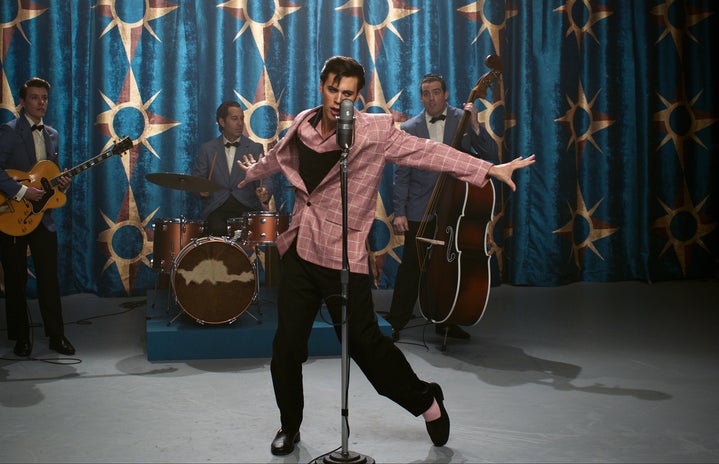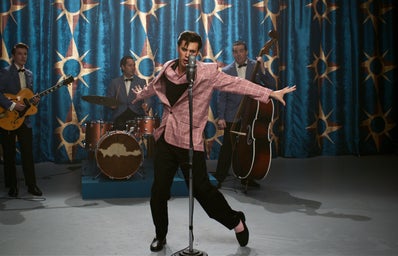Typically, a biopic is a biographical movie that focuses on and romanticises certain events of a famous person’s life, often to appease fans and attract more. It’s different to a documentary because the famous people in the title screen are played by other famous people who either look like them or are cast for audience appeal. A biopic is based on events and does not contain real footage of the honoured (or dishonoured) star(s) in question. Often, directors take their own creative liberties with how the stars are portrayed – omitting important facts, people or events of their life or even adding things that were never there. There is nothing inherently wrong with biopics, they’re arguably one of the most popular genres in Hollywood right now and have been for some time. But owing to the traits of the genre I’ve listed so far; the biopic has some serious problems.
The latest biopics that have taken Hollywood by storm generally revolve around famous musicians, the most recent being Elvis, with the title character played by Austin Butler. Other honourable mentions include Bohemian Rhapsody, a Queen biopic, Rocketman, focusing on Elton John, and Walk the Line centred on Johnny Cash. Musicians aren’t the only ones to be recognised with a biopic however, many actors of the golden age such as the upcoming Blonde, the Netflix biopic of Marilyn Monroe, or Extremely Wicked, Shockingly Evil and Vile, the biopic of serial killer Ted Bundy. While many of these films proclaim to be created to celebrate the lives of these people or educate audiences on their infamous acts, it all remains a romanticisation, further glorifying those who shouldn’t be glorified and stripping away important parts or events of the stories of those who were shaped by them.
The most glaring problem with biopics is casting, evident in Extremely Wicked, Shockingly Evil and Vile, where Ted Bundy was cast by former teenage heartthrob, Zac Efron. Besides the fact that the movie itself disregards the families of those who lost loved ones to Bundy, casting someone with the cinematic history as Efron encourages teenagers and young adults to sympathise with his character, simply because of the kind of movies he’s been associated with in the past. That would be like casting Colin Firth, beloved gay dad in Mamma Mia or awesome Kingsman superspy, as a wife-killing sociopath. Oh wait, they already did that too. With casting comes the romanticisation of celebrities/famous people. Often, this is achieved by the exclusion of instances where said beloved celebrities were not really the good guys that the movie makes them out to be.
Take Elvis for example, according to USA Today, the movie failed to mention, let alone explore, Elvis’s troubling relationships and courtships with underage girls. This film, like many others, fails to provide new insight into the real person’s life. And this speaks to the failure of many biopics, which all tend to become a simple repetition of events rather than providing genuine meaningful nuance. When it comes to biopic filmmakers putting their own spin onto a celebrity’s life, take the mini-series Pam and Tommy, a whole biopic series about Pamela Anderson and drummer Tommy Lee’s unauthorised sex tape. The creator, Robert Siegel, made the series without either Anderson or Lee’s consent, further speaking to how biopics about living people, and especially their scandals, raise some moral and ethical questions. But hey, at least the producers got what they wanted in the end right?
With the way biopics have been going, the trajectory of the genre can seem quite bleak. I for one, am worried about how Blonde will handle the iconic image and life story of Norma Jeane or Miss Monroe. I guess only time will tell whether she will be portrayed simply as the ultimate sex symbol she was in her classic films, or if more nuanced aspects of her life will be explored.
Although I’ve offered you some persuasion against biopics, the genre really isn’t all that bad. There are some movies written by brilliant filmmakers who truly had a love for the subject matter or passion for the story they had witnessed and wanted to retell. For example, movies such as Lin-Manuel Miranda’s Tick, Tick Boom with Andrew Garfield; Sofia Coppola’s Marie Antoinette, with Kirsten Dunst or even David Fincher’s The Social Network with Jesse Eisenburg as Mark Zuckerburg. As vox.com’s Alissa Wilkinson states in her article on biopics: “A great biopic doesn’t just remind us of what happened in someone’s life and the order in which it all happened. It provides new insight into its subject or uses them as a way to touch on bigger themes.” And all of these films deliver on that front, stylistically and narratively. All of these films offer praise where deserved and expose where needed, exploring each famous figure’s life in a way that adds to their life and our viewing experience.


